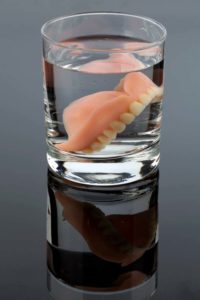
Anyone with missing teeth will agree that dentures are the best thing since sliced bread.
Being artificial teeth, however, you have to adjust to get used to them. The first few days with new dentures may feel a little awful. But you will shortly get used to wearing them. Your mindset plays a major role in how fast you adapt to new dentures. You must understand that a denture is an alternative to having no teeth, not a substitute for your natural teeth. They are designed to last at least 5 years. With proper care, they can even last up to 10 years. But just like natural teeth, your dentures need regular maintenance to last that long.
Adapting to New Dentures
Like any new experience, you’ll need to be patient with your new dentures in order to get used to them. Depending on the nature of your oral tissue, there may be slight spasms of pain within the first 2 to 3 days of wearing your new denture. You may have to put up with some soreness in the beginning, as you’ll need to leave your denture in your mouth for the first few days.
Your DP will tell you how long you should wear your dentures before you can start taking it out at bedtime and during the day for cleaning.They will also make any adjustments to your dentures as required after they have been inserted. Whichever the case, the experience should naturally improve after the first 48 hours. These two days are the most challenging. These are among the challenges that you may encounter and how to overcome each of them.
+ Speech is affected
New dentures may affect your speech, but this can easily be solved. . Simply practise reading out loud or singing – whichever you prefer.
Either of these will exercise your tongue and let it find the right position to produce clear speech.
Slow down if your talking is impeded. Eventually you’ll pinpoint the pace you’re comfortable in when speaking with your new denture.
+ Retention and Stability of Dentures

And note that not all new dentures need adhesives. There are some dentures that use other mechanisms to have stability and retention. For best results, consult with your DP.
+ Suction with a New Denture
It may take 24 hours for your new denture to achieve proper suction depending on the type of soft tissue in your mouth and the amount of bone available. Note that an upper denture may take longer than a lower one.
However, a full lower denture will rarely have the same suction as the upper denture. Here’s a tip: some people can make the suction of their new dentures become stronger by drinking through a straw.
+ Excess Saliva

The water also helps in maintaining the right levels of moisture in your mouth during the early stages of wearing a new denture.
Care for New Dentures
Your DP will often ask you to keep your new denture in your mouth for at least 2 days. This is a challenge given the discomfort brought about by new dentures.
Removing the denture prematurely for whatever reason may cause your gums to swell and make it impossible to put the denture back into the socket.
Bleeding may also occur and the tissue that’s been freshly operated on may be affected.
In case you feel some pain or soreness, do not hesitate to inform your DP about it.
Clean your dentures at least twice a day. Just like your natural teeth would require brushing after every meal to control bacteria, your dentures equally need regular removal and cleaning for your oral hygiene and overall health.
Massage your gums to improve blood flow. Removing your new dentures for cleaning during the day will allow you to massage your gums to boost blood flow and ease nerve tension.

If this is not an option for you, then be sure to find at least two other times of the day to take out your denture.
Regularly check in with your DP
Some people brag that they have not seen a DP for x amount of years, You require to get your dentures checked every 2-3 years. Your jaw and facial muscles change shape every year plus the teeth in the denture can wear down, depending what teeth you decided on putting into the denture.
Summary
Dentures improve your appearance and boost your confidence. How long your dentures last will depend on how well you look after them. To prolong their usage, follow the denture care procedures given here and the recommendations of your DP.











